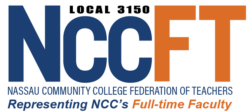 As we come to the close of the Fall 2018 semester, we should be proud of what we have accomplished. We are now in complete compliance with Middle States; we’ve begun an honest discussion regarding recruitment and retention; a reorganization of Developmental Education is under way; Board of Trustees Policy 3100 (News Media Relations) has been amended; the college has begun hiring new full-time faculty; and the NCCFT membership now comprises 100% of our bargaining unit (in spite of the Janus decision).
As we come to the close of the Fall 2018 semester, we should be proud of what we have accomplished. We are now in complete compliance with Middle States; we’ve begun an honest discussion regarding recruitment and retention; a reorganization of Developmental Education is under way; Board of Trustees Policy 3100 (News Media Relations) has been amended; the college has begun hiring new full-time faculty; and the NCCFT membership now comprises 100% of our bargaining unit (in spite of the Janus decision).
Even as we celebrate these accomplishments, however, we must prepare to face the challenges that will confront us in the new year. These include taking concrete action to improve recruitment and retention; advocating for amendments to Board of Trustees Policy 2400 (Anti-Bullying and Anti-Stalking); defining and implementing a campus-wide model for NCC 101; hiring a new president, and, we learned at the most recent Academic Affairs meeting, re-examining our General Education requirements.
I’m going to address these challenges one at a time.
Improving Recruitment and Retention: The Elected Academic Leaders Council (EALC), formerly known as the Governance Council—which includes the Chair of Chairs, the Chair of the Academic Senate, the President of the Adjunct Faculty Association, the NCCFT President, and selected members of Dr. Keen’s cabinet—has agreed to hold during Spring 2019 a follow-up colloquium to the Recruitment/Retention Colloquium that took place this semester. Ideally, this colloquium will build on work that is already underway, including the restructuring of our Developmental Education program within what will be as of January the newly renamed Department of Critical Reading and Academic Advancement (DCRAA); the realigning of Math requirements for both STEM and non-STEM students; and the implementation in the English Department of the Accelerated Learning Program (ALP) and, in the Math Department, of Quantways. We all agree that recruitment and retention are issues of central importance not only to our students, but also to NCC’s financial stability. It feels good to be addressing these issues in concrete terms, and, since failure is not an option, I am optimistic about our chances for success.
General Education and NCC 101: During the recent Academic Affairs meeting, Professor Ethel Weeks presented a white paper developed by the SUNY General Education Review Task Force and announced last year to the Faculty Council of Community Colleges (FCCC). Regardless of why we did not learn about the immediacy of the white paper when it was first announced, it represents a serious challenge that we need to address now. Simply put, the required competencies it defines within SUNY’s GenEd categories do not match the competencies required by the Middle States Commission on Higher Education. We need, in other words, to create a GenEd paradigm that not only accounts for both SUNY and MSCHE competencies, but that also includes NCC 101; and we need to do this yesterday. The FCCC is asking for input from Community College Senates so it can respond to SUNY in Spring 2019, but SUNY plans to implement this new General Education policy in the Fall 2019 semester with or without our input.
There’s another reason this tight deadline poses a problem for us at NCC. Whatever restructuring we do of our General Education requirements must both include NCC 101—since it is central to our recruitment and retention plans—and be done within a 64 credit limit. Some of you will remember from last year that SUNY assured us they would waive the 64-credit restriction so we could add the one-credit NCC 101 as a degree requirement. This year, unfortunately, they have determined that we missed a phantom deadline and so the waiver will not be issued.
There is another reason for us to be wary of SUNY in this regard, and it concerns the institution’s history of mandating requirements such as GEAR and SUNY Seamless, insisting these initiatives are designed in the best interest of our students, only to find out that is not the case. Dr. Valerie Collins has assured us that this new white paper does not include a mandatory drop in degree requirements to match SUNY’s 60-credit minimum for an Associates. Nonetheless, it would be foolish of us not to account for that possibility as we figure out how to respond to these new, top-down mandates. That discussion will be difficult. However, I have every confidence that we will rise to the challenge and produce the best academic position paper possible.
The BOT’s Anti-Bullying and Anti-Stalking Policy (2400): I have publicly and consistently stated my concerns and objections to language in what was originally the Senate’s “Civility Policy” and is now Board of Trustees Policy 2400 (Anti-Bullying and Anti-Stalking). Bullying and stalking are, of course, unacceptable behaviors. As written, however, this policy includes vaguely defined actions like laughter and staring as descriptors of such behaviors, raising serious questions of how the policy will, or even can, be enforced. The NCCFT has asked NYSUT’s legal division to review Board of Trustee Policy 2400, and we will proceed appropriately upon receiving NYSUT’s analysis.
Finally, an issue has come to my attention regarding the financial disclosure forms that the Nassau County Board of Ethics for a number of years now required members of our Board of Trustees, various Administrators, Academic Department Chairpersons and members of the Promotion and Tenure Committee to file. These forms have been FOILed. While the college attorney has some leeway in determining what if any information on these forms will be redacted, we cannot know ahead of time which information will be. As a result, anyone on campus who has filed a financial disclosure form is at risk of having their personal information exposed, if the person who FOILed the documents chooses to make that information public. Our Freedom of Information laws are designed to ensure and provide for transparency in government, a purpose the NCCFT supports whole heartedly. It would be unfortunate, however, if the information obtained through these FOIL requests were to be used for other reasons.
On behalf of the NCCFT Executive Committee, I wish you and your loved ones a healthy, safe and happy holiday season and new year.
This post has been edited to make two small corrections that improve the accuracy of the paragraph on General Education.
